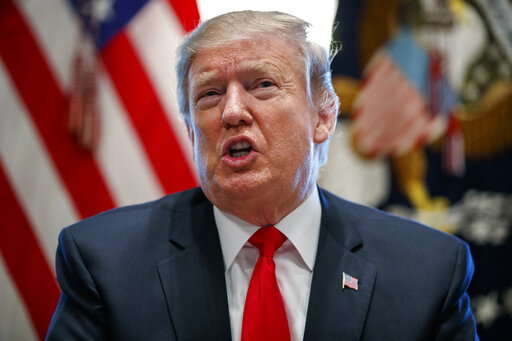WASHINGTON (AP) — For all of President Donald Trump’s talk about “America first,” the next two years of his presidency could shine a sharp spotlight on America abroad.
His State of the Union address next week will be dissected for clues on how he’ll deal with a full plate of foreign policy challenges. His words will serve as fodder for ongoing partisan debate about whether his decisions will have passing or long-lasting effects on the world.
Will he pull troops from Afghanistan? Can he coax North Korea to abandon its nuclear weapons program? What will America’s future role be in Syria? What about U.S. power struggles with China, Russia and Iran, instability in the Middle East and U.S. relations with European allies?
“There is so much polarization around this whole discussion of Trump — pro-Trump, anti-Trump — that it’s hard to make sweeping declarations about the success or failure of Trump’s foreign policy,” said John Hannah, who has held foreign policy posts in both Democratic and Republican administrations.
“There’s been some good and some bad, but also a risk that the president’s own unpredictability is undercutting some of his important achievements,” said Hannah, who is now with the nonpartisan Foundation for Defense of Democracies.
Trump campaigned on a nationalist platform he calls “America first,” telling voters it was time to “shake the rust off” conventional U.S. foreign policy and make addressing problems at home the top priority. His administration has torn up multilateral treaties, has focused more squarely on the threat from China — its trade policies and theft of U.S. intellectual property — and wants to pull America out of what Trump calls “endless wars.”
Nobody seemed fully prepared, though, for Trump’s bull-in-a-china-shop approach to foreign relations — picking fights with allies, embracing Russia, announcing via Twitter an abrupt withdrawal of U.S. troops from Syria and rattling nuclear sabers with North Korea’s Kim Jong Un.
At the halfway mark of his term, Trump will use his address to Congress next week to talk about progress in fighting Islamic State militants, who have suffered a significant loss of real estate in Syria through pressure from the U.S. and its partners, though intelligence officials say the threat has not been extinguished.
He’s expected to boast of opening trade talks with China and denuclearization talks with North Korea although neither deal has yet been reached, take credit for a hard-line stance against Iran through economic sanctions and make a case for ending or reducing U.S. involvement in Afghanistan.
He’ll award himself high marks on foreign policy and tease new action to come.
“We’re not going to be leading from behind anymore,” he told reporters this week.
His critics, however, see “America first” as a slogan that translates to “America alone.” They deplore his distaste for multilateral organizations — Trump has withdrawn from the Paris climate accord, the Iran nuclear deal, the U.N.’s top human rights and educational agencies, and the Trans-Pacific Partnership trade deal. On Friday, Trump said the U.S. is pulling out of an arms control treaty with Russia.
Sen. Bob Menendez of New Jersey, the ranking Democrat on the Senate Foreign Relations Committee, calls “America first” a mix of xenophobia and isolationism that has meant abandoning U.S. values, insulting partners, ignoring human rights and the rule of law, and taking a 19th-century view of the world.
“I really struggle to find the basis under which this ‘America first’ policy has advanced America’s interests abroad,” Menendez said. “I think, at this point, things can be reversed, but the longer his policy gets pursued, the more permanent the damage will be.”
Kenneth Pollack, a Mideast scholar at the conservative-leaning American Enterprise Institute, calls “America first” a “bumper sticker that obviously appealed to many people.” But he’s worried about the long-term effects of it, especially the president’s move to exit Syria.
Foreign policy experts write off some of Trump’s actions as theatrics, but the pullout in Syria, many think, is a gift to Russia and Iran. They say it reduces U.S. influence in neighboring Iraq, leaves room for Islamic State militants to regroup and allows Iran to consolidate control in the region and threaten its archrival, Israel.
“He’s walked away from Syria, which has just been catastrophic in terms of our relationships with our allies,” Pollack said.
Some foreign policy experts argue that giving Iran room to further entrench itself in Syria actually undercuts Trump’s own maximum pressure campaign on Tehran.
In May, he pulled the U.S. out of the nuclear pact the Obama administration and U.S. partners negotiated with Iran. Under the deal, Iran agreed to rein in — but not give up forever — its nuclear weapons program in exchange for an easing of economic sanctions.
Since then, Trump has ramped up sanctions on Iran while other parties in the deal — China, France, Germany, Russia and Britain — try to do business with Iran without running afoul of U.S. sanctions.
“The Iranians haven’t restarted their nuclear program, and U.S. relations with Russia, Europe and China haven’t ruptured — all of that’s true,” said Pollack, a former CIA analyst and National Security Council official. “But we haven’t necessarily gotten anything from pulling out of the deal either.
“The way that Trump has been handling Iran, I could see scenarios where we could get into a war with Iran,” he said.
When Trump delivered his last State of the Union, the world was worried that the president and North Korea’s Kim were arguing about who had the bigger nuclear button on their desk. Then in mid-2018, all the warmongering stopped. Trump held a historic summit with Kim in Singapore, declared the communist nation was no longer a nuclear threat and said the two leaders “fell in love.”
But while there is no concrete denuclearization deal yet, Trump is getting ready to go to Asia for a second summit with Kim in coming weeks, and he may use Tuesday’s speech to announce the summit date and place.
Since Trump’s abrupt decision to exit Syria, there has been growing fear that Trump will yank troops from Afghanistan, too, tapping into rising public support for ending the 17-year-old war. As the Trump administration negotiates with the Taliban, 14,000 U.S. troops are still training and assisting Afghan forces and fighting terrorist networks to prevent the country from being a staging area for attacks on the West.
At the same time that Trump is derided for insulting allies, he is credited with working alongside them and got bipartisan support this month when he took a tough stand against Venezuela’s embattled, socialist president Nicolas Maduro.
“With Venezuela, he’s not going it alone,” said Jason Marczak, director of the Atlantic Council’s Latin America center.
Working with partners, then demeaning America’s best friends is just one example of Trump’s often contradictory style on the international stage.
While he stood firm against Maduro in Venezuela, he has cozied up to other leaders, including Russia President Vladimir Putin and China President Xi Jinping — two countries that the U.S. will be in a power struggle with for years to come.
He says he gets along great with Xi, but the two are locked in a trade war. Trump says he’s been tough on Russia, yet he was harshly criticized in Helsinki for not publicly denouncing Russia’s interference in the 2016 U.S. election and appearing to accept Putin’s denials of any meddling.
He said the killing of Washington Post columnist Jamal Khashoggi inside the Saudi consulate in Turkey was heinous. But while the U.S. sanctioned 17 Saudis believed to have been complicit, Trump would not impose harsher penalties on Saudi Crown Prince Mohammed bin Salman, citing the importance of economic and other U.S. cooperation with the Gulf ally.
“My policy is very simple,” he said. “America first.”





